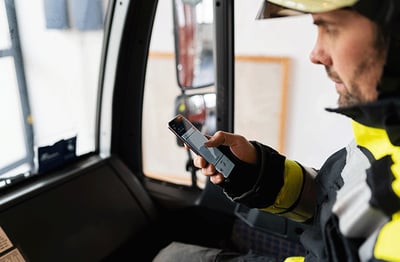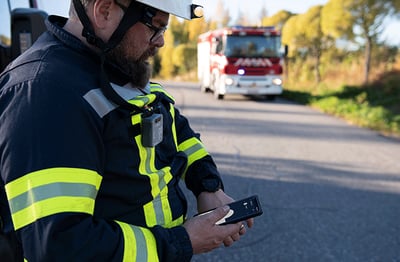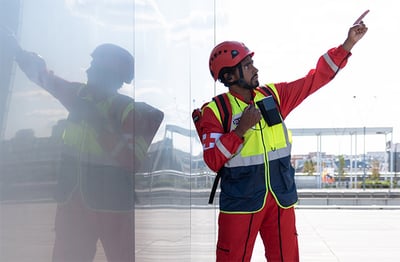According to Airbus' sixth annual mobile apps survey, one of the biggest challenges faced by user organizations is finding apps that solve real problems, while also being secure. To help you narrow down your search, here are five of the most fascinating examples of LTE and TETRA working with applications.
Hybrid communication solutions use both broadband and narrowband technologies, for example LTE/4G/5G and TETRA. Below, you'll find a list of five of the most fascinating examples of use cases for hybrid communications:
If you want to know what professional users look for in an app, get the revealing statistics from the Airbus survey on professional app users 2022 – visit the Mobile app trends site or download the report “Professional app trends 2022 - 37 things you wish you'd known earlier”:
1. How to achieve precise positioning, anywhere?
Who is the app for? First responders, security personnel, industry workers.
Imagine an incident inside a shopping center or in a big office block. A security guard on the spot calls their dispatcher or team members asking for help. With GPS, the dispatcher can only see the caller’s approximate whereabouts, but not his exact indoor location. The security guard must explain where they are, taking additional time – and, if the situation is complex, they may not be able to give further information.
How to solve this problem? With Guardian (SenTAct) app by epic.blue.
What makes it special? When the security guard has the app on their hybrid device or smartphone, the dispatcher will know their exact indoor coordinates. And exact means exact – for example, this person is located on the fifth floor, in wing A, room 212.b.
What’s more, Guardian has an embedded Artificial Intelligence engine, which provides accurate and real-time location data, both indoors and outdoors, without the need for GPS or any fixed infrastructure for location. The engine will also detect a “man down” situation.
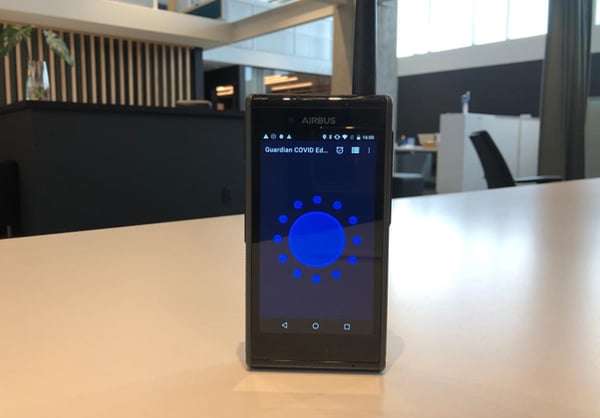
Maintain social distancing
In response to the challenges due to the COVID-19 pandemic, the Guardian app can also help organizations to build resilience into their operations and make staff feel safe at work. With the app, they can implement social distancing and manage COVID policies. For example, if a member of staff has been tested positive for COVID-19, organizations can trace whom the person has been in contact with, and the spread of the infection can be limited. Users of the Guardian app will get sound or vibration alerts when other users are within a set range. Alert thresholds also include exposure time as a factor. This solution is fully GDPR compliant as no personal data is recorded.
The Guardian (SenTAct) app won an award in the Critical App Challenge Middle East, organized by Airbus in October 2018.
2. How to share real-time, high-resolution imagery – even with low bandwidth?
Who is the app for? Police, emergency services, civil protection, defence forces.
Police and emergency services can share video on dangerous situations as they happen, ensuring team members and the control room can provide better support. This is true for any video sharing app.
But imagine a situation where emergency services are called out to a block of flats due to noisy disturbance in one of the apartments. Not only are the police and paramedics coming, but a crowd of curious people gathers in the yard to see what’s happening. What’s more, they take pictures and video of the scene and share them with their contacts and on social media. In other words, they are hogging bandwidth, meaning the public safety professionals may not be able to share their own video, particularly if LTE QoS is not in use.
How to solve this problem? With the ASIGN app by Ansur.
What makes it special? The ASIGN app compresses and optimizes video and images to take up minimal bandwidth, while still achieving high quality.
And that’s not all – when the command and control center receives the video or images, they can see initial preview data very quickly (a picture of a building, for example), select an area to zoom into, and pull out exactly the details they need, and in high resolution. For example, it will be possible to identify an object held by a suspect.
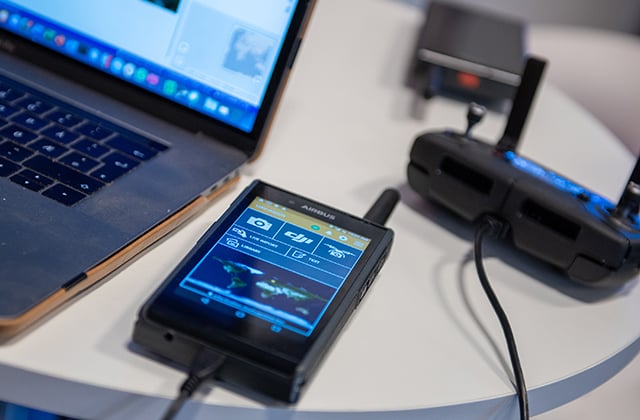
Images via satellite
The ASIGN app works in a hybrid TETRA and broadband network and with satellite or cellular only networks.
The ASIGN app won an award in the Critical App Challenge Nordic, organized by Airbus in September 2019.
3. How to keep borders safe, more efficiently?
Who is the app for? Border control, police, premises security.
Criminals often hide behind multiple identities. They are also increasingly sophisticated, which makes detection of fake IDs challenging. This often requires experts in document fraud, who are not always available when needed. There are also a lot of people trying to cross the borders without any ID. Verifying such an individual’s identity can be extremely difficult and time consuming, taking an officer away from field work.
How to solve this problem? With secunet bocoa app by secunet Security Networks AG.
What makes it special? Thanks to secunet bocoa app, border control officers in the field can easily identify fake IDs on the spot and also verify an individual's identity using database queries and biometric verification, such as fingerprints. For example, with this app you can compare a border crosser’s picture on the passport with their face, getting an indication of whether their ID is genuine. If no ID document is available, biometric verification, such as fingerprints, can be sent to the back end to check if the person is a known criminal. Officers can also take a picture of the person and easily file a report in real-time in the field.
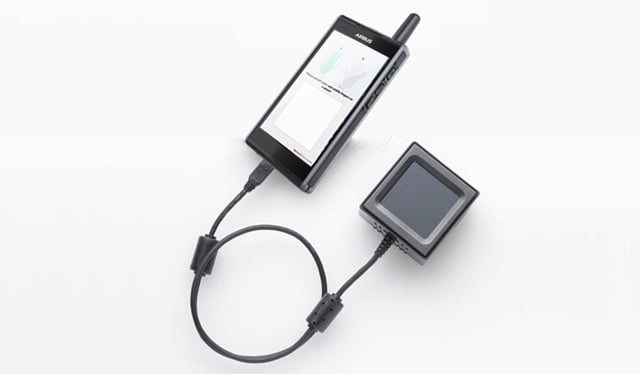
It’s fast, secure and effective, helping officers complete their duties more efficiently. It also means that more of the forged, falsified or stolen ID documents and fraudulent identities can be detected. As a result, officers can spend more of their time on critical issues.
secunet is one of the three companies who won the Tactilon Dabat award, granted by Airbus in December 2017. The secunet bocoa app is currently being used by the German Federal Police and Zurich Cantonal Police.
Hand-picked tips for you –
Do you have a fascinating app of your own that would meet professional users’ needs? Join SmarTWISP – the Airbus application developer programme for the mission critical market.
Or see on video: 5 app developers tell us why they started developing mission-critical, professional apps.
4. How to build a private social network that remains confidential?
Who is the app for? Any professional organization.
While social media is incredibly valuable and beneficial for connecting and engaging with people, it’s a public forum. It is easy to use but only for public information – organizations cannot use public social media platforms to share confidential information within a controlled group.
How to solve this problem? With Mesensei app by Mesensei.
What makes it special? With Mesensei, organizations can get a branded mobile app to engage directly with their community – their contacts – in their own space, while retaining control over the data. It’s basically the same platform as other social media platforms (like LinkedIn, Twitter and Facebook) – but for organizations who need to share confidential information within their community. With Mesensei, an organization can share information within a controlled community, confident that it will remain confidential. At the same time, the experience is the same as that provided by public social media platforms.
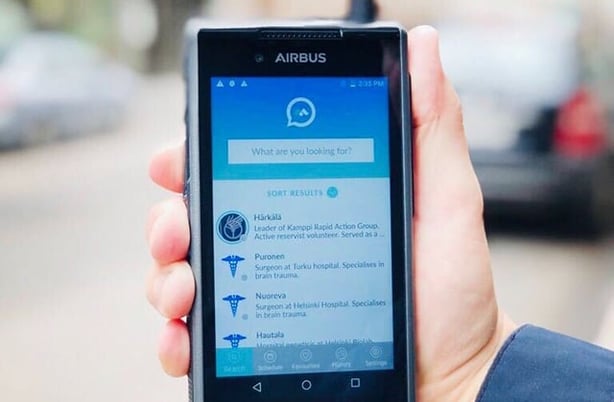
What’s more, The Mesensei app also ensures your online community complies with the GDPR regulation in Europe.
The Mesensei app won an award in the Critical App Challenge Nordic, organized by Airbus in September 2019.
5. How to give warnings of an approaching train?
Who is the app for? Train track workers.
Every year, several hundred people are injured by a train when working on train tracks. Accidents happen because trains are directed to different tracks, situations change quickly and there is no reliable warning system for train track workers.
How to solve this problem? With Track Worker Protection (TWP) app from Intelligence on Wheels (IoW).
What makes it special? The TWP app warns staff working on tracks when a train is approaching — even when there is no 3G/4G/5G network coverage.
Instead of depending on warning horns, each person is alerted via their own smart device, using sounds, visuals and vibration. Thanks to the pre-warning, there's enough time for the worker to safely leave the tracks. There is no need for a person to stand watch – the app does it all. It saves lives while also cutting costs.
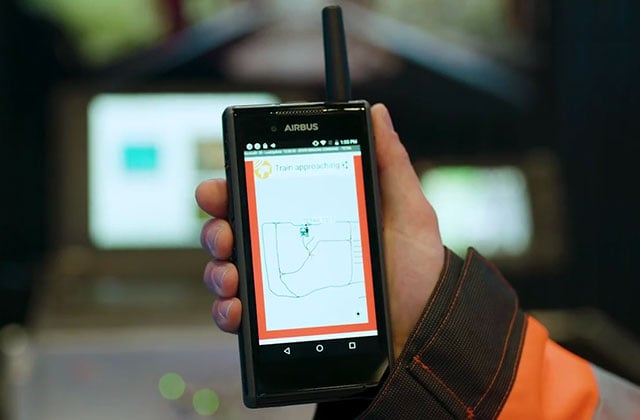
The TWP app won an award in the first Critical App Challenge, organized by Airbus in February 2018.
Such practical apps!
These are all practical apps that work in the Tactilon Dabat hybrid device. They also meet the requirement for security and control of data, the key requirements for professionals according to the seventh annual survey on the professional apps market. Download the survey report:
All the five innovative apps have won an award. secunet has won the Tactilon Dabat award, granted by Airbus. The other four apps have won an award in Critical App Challenges organized by Airbus. The independent juries included representatives of user organizations and operator companies and thus were able to spot the apps which had practical potential. And as you saw from this blog post, a truly useful app can tackle real-life problems in fascinating ways.
You might also be interested –
Professional apps vs. mainstream apps – what is the difference?
Editor's note: This blog post was first published in June 2020 and it was updated in April 2022 to refer to the latest available survey report.


